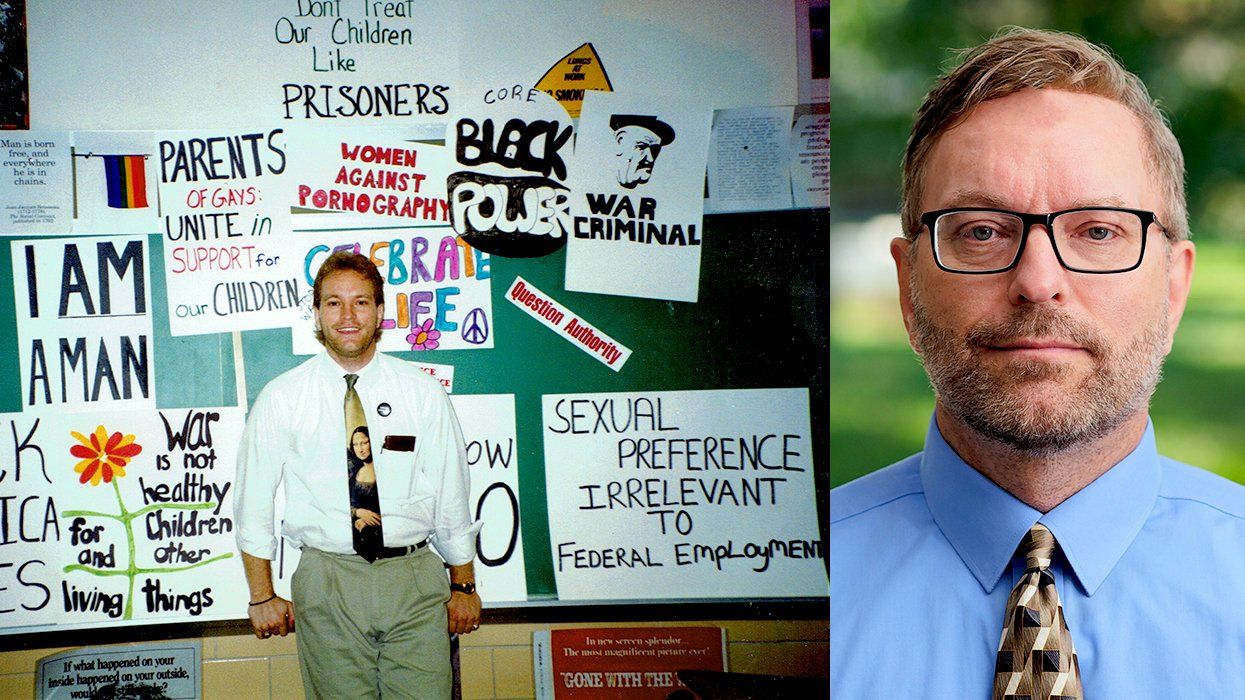October, traditionally adorned with the vibrant hues of LGBTQ+ History Month, is a time of reflection and celebration of the community’s past, underlined by a pressing discourse on the contemporary educational and political landscape surrounding LGBTQ+ rights.
At the heart of this dialogue is Rodney Wilson, the pioneering educator behind the inception of LGBTQ+ History Month back in 1994. In an intimate conversation Tuesday with The Advocate, Wilson delved deeply into the challenges and evolving conversations within the community and the educational sphere.
Wilson’s journey began in a suburban St. Louis high school classroom, where he envisioned a dedicated month to commemorate LGBTQ+ history, akin to the observances for African American and women’s history.
October was earmarked, aligning with significant LGBTQ+ milestones and the academic calendar. Over the years, the initiative garnered endorsements from various states and prominent LGBTQ+ organizations, evolving to embrace the diverse identities within the community.
Related: The Story Behind the First LGBT History Month
In his conversation with The Advocate, Wilson, 58, addressed the ongoing contentious movement of “LGB without the TQ+,” which is made of gay, lesbian, and bisexual people who believe that transgender people and other identities should not be lumped in with the former.
“It’s hard to get my mind around it, honestly," he said. "I don’t understand how anyone would want to quite literally cut a group out of a community. ... But to take a knife and cut off a letter that symbolizes an identity that we all need to be educated about, we all need to learn about, is so frustrating and sad to me.”
Wilson reminisced about the initial naming of the observance as Lesbian and Gay History Month in 1994 and reflected on the community’s growth.
“It did not cross my mind in 1994 to call it Lesbian, Gay, Bisexual, and Transgender History Month. It just didn’t cross my mind. But we are supposed to learn and evolve and grow and continue to open ourselves up to new individuals, new understanding, new information, new identities,” he said.
The discussion extended into the current political atmosphere, where numerous bills targeting LGBTQ+ rights have been introduced in many Republican-led state legislatures and passed in several.
Florida’s “don’t say gay” law initially limited instruction about sexual orientation and gender identity to students older than third grade, but the Ron DeSantis administration has extended the prohibition to all include public school students through graduation.
Wilson lamented the detrimental impact on young individuals.
“Young people who are 16, 17, they’ve not figured it all out yet … they’re learning and growing, and to have individuals targeting them within the community that is supposed to just accept everybody. ... it’s very sad,” he said.
Touching upon the historical resistance toward LGBTQ-inclusive education, Wilson recounted similar challenges, from Anita Bryant’s “Save the Children” campaign in 1977 to California’s Briggs Initiative in 1978, drawing parallels to today’s anti-LGBTQ+ climate. He underlined the recurring “queer panics” around educating the young on LGBTQ+ issues, emphasizing how history has seen numerous periods of opposition against inclusive education.
In the face of adversity, Wilson envisioned continuous education and open dialogue to foster understanding and inclusivity.
One poignant moment arose when Wilson recounted a recent interaction with a gay man in his late 50s, who inquired about the alterations to the once-familiar "gay flag" of the 1980s and 1990s.
“When I explained that all flags change, that the USA flag, for example, has been modified two dozen times since the 1770s and that the one we have today dates back only to 1959, when Alaska and Hawaii joined the union, and that the U.S. flag could change again if another state joins the union, it made more sense to him why the 'gay flag' has changed — that it has evolved to forthrightly acknowledge the integrity of the whole of the community, without diminishing any of the groups already included,” Wilson said.
“Adding a color to the Gilbert Baker flag or adding a letter to our initialism does not detract from the worth or value of the colors and letters already present," he added.
Reflecting on the broader scope of acceptance within the community, he urged, “Teach me. We all should be humble enough that we can say, ‘I’m sorry, I am ignorant about this. Teach me. Help me grow. I want to understand…’ There’s nothing wrong with not understanding something — nothing at all. But good people seek understanding.”
The conversation circled back to the collective power of inclusivity within the LGBTQ+ acronym, where Wilson reflected on the strength derived from a cohesive community embracing a spectrum of identities.
“There’s strength in numbers, there’s strength in cohesion, there’s strength in community. There’s strength in having a wide variety of people with different experiences and the insight that comes from having different experiences,” Wilson said.





































































Charlie Kirk DID say stoning gay people was the 'perfect law' — and these other heinous quotes